This extract is from SEO in the Gemini Era by Marie Haynes ©2024 and reproduced with permission from Marie Haynes Consulting Inc.
Much of the SEO advice you will see online today is borne from shared community wisdom that was learned about Search in the days before Google was actively using AI.
So much of what many of us do as SEOs and treat as standard practice is based on a search engine that was a list of heuristics – handwritten rules programmed by humans. So much has changed.
For example, let’s say you are tasked with creating a new article for the website you are working on.
You’ll likely start with keyword research because we know that in order to appear relevant to a search engine, you need to write content that covers a topic thoroughly and uses keywords that are semantically related to your topic.
So much of the content that we have on the web today is borne from a process that looks like this:
- Do keyword research to see what your competitors have written.
- Create content that’s similar but perhaps a little bit better, or more comprehensive than theirs.
- Do keyword research to see what other people have covered, but you have not included.
- Create content that covers that stuff too.
- Do People Also Ask research to find related questions to cover so that we can write content that looks even more relevant and comprehensive to search engines.
- Create more content to answer those questions even though Google already has content to answer them.
Nothing in that process is causing us to create content that truly is original, insightful, and substantially more helpful than what exists online.
Yet, that is what Google wants to reward!
An SEO agency will often spend many hours each month improving the technical SEO of a site, improving the internal link structure, or perhaps getting external links and mentions. These are all things that can possibly help a webpage to look better to a search engine.
They are not bad things to do and some of them have the potential to help a site improve. But again, those things are unlikely to make the content on a page substantially more helpful to searchers, which is, once again, what Google wants to reward.
I want to be clear here. I’m not saying that technical SEO is dead.
There are benefits to be had by having a technically sound, fast site that search engines can easily navigate and understand, especially if you have a large site.
Schema can still do wonders when it comes to helping Google understand your business and its E-E-A-T, especially a new one. There are some verticals where technical improvements will give you enough advantage to improve rankings to some degree.
There is one thing that makes content more helpful.
Are you ready for this deep, insightful secret?
Here it is…
The secret to having content that is likely to be considered by Google as more helpful than others’ is to have content that users are finding helpful.
A Mindset Shift Is Needed For SEOs
For more than a decade now, my main source of income has come from advising businesses how to improve their search presence.
I have pored over every word Google has published that talks about what it is that they want to reward and have produced pages and pages of checklists, training documents and advice.
I had one goal: Help people understand what it is that Google rewards, and help them become that result.
Do you see the paradox that is hidden in that statement? The more I think about it, it’s laughable!
I didn’t realize the whole time that while I was preaching on creating People-first content, as Google now calls it, much of what I was doing was geared far more towards satisfying Google than searchers.
Other SEOs are catching on to this mindset as well now. What users do on our websites matters immensely. The actions of users shape Google’s rankings dramatically.
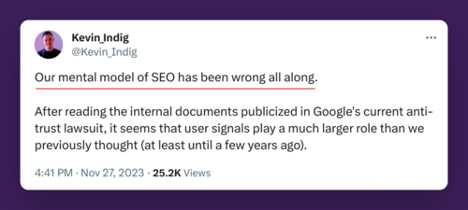 Screenshot from X/Twitter, July 2024
Screenshot from X/Twitter, July 2024I have historically treated Google’s guidance on creating helpful content as a checklist of things we could look to for improvement.
Have an author bio? Check. Good descriptive heading? Check. Demonstrating experience? Information gain? Another check.
My first book on creating helpful content takes you through multiple checklists like this. You can see improvement by working through these checklists.
Actually, I know this as I commonly will have people reach out to me to tell me that they have implemented changes based on the checklists and have been seeing improvements.
But, it turns out what Google gave us was not a list of criteria to be analyzed as a checklist!
I realize now that what Google was telling us was: Our systems are built to reward the types of things that people tend to find helpful and reliable. And if you want to know what that is, here are some ideas.
It’s not a checklist, but rather, a list of the types of things that searchers tend to like. The algorithm is built to reward what it is that searchers like.
An author bio isn’t a ranking factor, but, in many verticals, demonstrating the experience of your authors is something that users like.
Core web vitals, metrics used to measure load time and other similar things, used to be a score we’d aim to get…but really, the reason we work to improve on core web vital scores is because users tend to like pages that load fast and don’t jump around.
It’s not like Google has a checklist or a scorecard when it comes to the quality of every page. Google doesn’t know exactly what your content is or whether it is high quality.
As we discussed earlier, search is a complex AI driven system that is trying to predict what searchers are going to find helpful.
Here are the full list of “ideas” Google gives us to help us understand what searchers might find helpful:
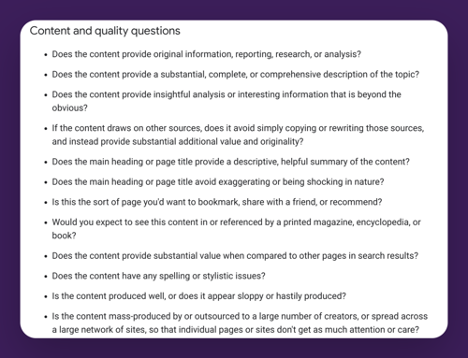
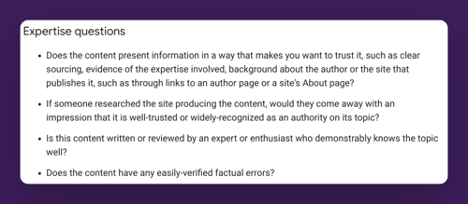

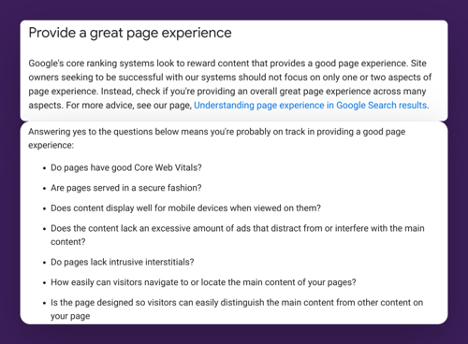
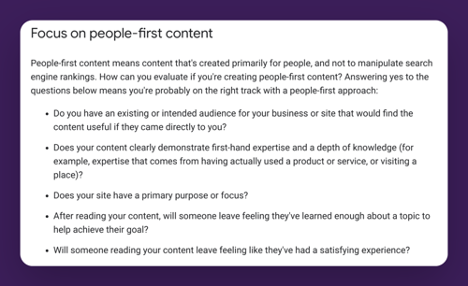
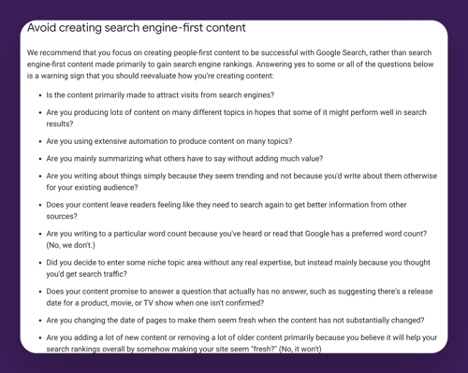
In the past I’ve taught on looking at these ideals one by one for inspiration on how you can improve your site. I still think there is great value in doing this.
But, now I realize I was missing the main point. I have been thinking about helpful content like an SEO.
If you are truly creating People-First content, you will already be aligned with Google’s helpful content recommendations.
I had it the wrong way around.
If you know what your audience’s needs are, and know the questions that they have, and you create content that answers those questions you are on your way to creating the type of People-First Content Google wants to reward.
People First Content Is:
- Usually created by people with real world experience on a topic. A store that sells a product to real customers is more likely to produce helpful content advising people on that product. A person who advises professionally on a topic, is more likely to have fresh content that understands the current needs of that audience.
- There is an exception to this: Sometimes authority can trump experience. We see this when a website like Forbes is ranking for [BBQ reviews]. In this case, Forbes is likely seen as a place that users trust for its overall authority in journalism. It’s got sufficient E-E-A-T to be considered a trustworthy answer for this query. And as long as searchers are indicating they are satisfied, it will continue to rank. (I think this will change though as we learn to create truly helpful content. We should start to see more truly helpful content from topic experts recommended.)
- Content that provides real value to searchers.
- Written clearly and concisely in a manner that is easy to understand.
- Original and insightful.
But how does Google determine this?
In the next section we’ll talk about something that has been mostly unknown to SEOs until just recently – just how much Google uses user engagement signals.
It turns out that Google knows what it is that’s helpful to people because signals from every single interaction that happens in search are fed back into machine learning systems with one goal in mind – for the systems to learn how to best work together to create present the searcher with information that they are most likely to find helpful.
Notes
[1] Creating Helpful Content. Marie Haynes. 2023. https://mariehaynes.com/product/creating-helpful-content-workbook/
To read the full book, SEJ readers have an exclusive 20% discount for Marie’s book, workbook and course bundle. The discount will be applied automatically by following these links:
- SEO in the Gemini Era book
- Put Yourself in the Shoes of a Searcher Workbook
- Full course bundle (includes the book and the workbook)
More resources:
- SEO Experts On Helpful Content: It’s Bigger Than You Think
- The Hybrid Human-AI Strategy In The Era Of Google SGE
- As Chatbots And AI Search Engines Converge: Key Strategies For SEO
- How Search Engines Work
Featured Image: MT.PHOTOSTOCK/Shutterstock




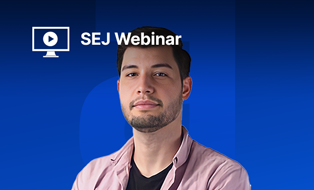
![[SEO, PPC & Attribution] Unlocking The Power Of Offline Marketing In A Digital World](https://www.searchenginejournal.com/wp-content/uploads/2025/03/sidebar1x-534.png)